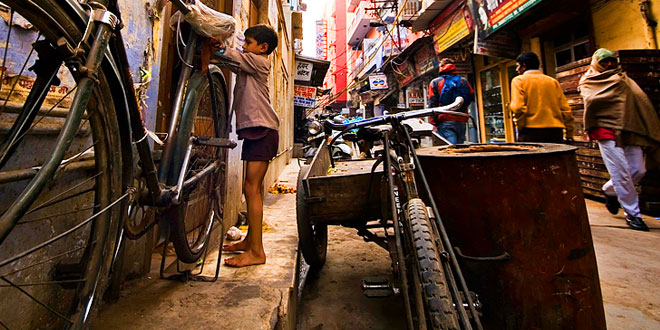Question: What type of life were the marginal groups of London living in the 1870s? Explain.
Answer:
- Most of the marginal groups included unemployed migrants, women and their children.
- Most of them made their living from crime.
- Many of them made their living by stealing lead from roofs, food from shops, lumps of coal, and clothes drying on hedges. There were others who were more skilled at their trade, expert at their jobs. They were the cheats and tricksters, pickpockets and petty thieves crowding the streets of London.
- A large number of women used their homes to increase family income by taking in lodgers or through such activities as tailoring, washing or matchbox making,
- With industrialization a large number of children were pushed into low paid work.
Question: What was the impact of industrialization and urbanization on the family in Britain in the nineteenth century?
Answer:
- Women gradually lost their industrial jobs and were forced to work within households,
- A large number of women used their homes to increase family income by taking in lodgers.
- Through the activities of tailoring, washing or matchbox making, they could increase their income. Large number of children were pushed into low paid work during this period.
Question: Explain the housing problem of Londoners which occurred due to industrialization.
Answer:
- A large number of people began pouring in London after the Industrial Revolution,
- Factory or workshop owners did not house the migrants.
- Individual landowners put up cheap, and usually unsafe, tenements for the new arrivals.
- Due to shortage of houses people started living in slums.
Question: Mention any three steps which were taken by the government to check criminalisation of London.
Answer:
- The authorities imposed high penalties for crime, and offered work to those who were considered the ‘deserving poor.’
- The Compulsory Elementary Education Ac; and the Factories Act were passed through which the children were kept out of industrial work.
- Tire population of criminals was counted and their activities were watched.
Question: (i) Who conducted the First social survey of low skilled London workers?
(ii) Mention any four factors responsible for the increase in criminal activities in London in the 1870s.
Answer:
- Charles Booth conducted the first survey of low skilled London workers in 1887.
- (i) Increasing population
(ii) Low wages
(iii) Lack of education
(iv) Pushing large number of children into low paid work by their parents.
Question: Explain any three reasons for the increasing concern about the need for housing for the poor in London after the Industrial Revolution.
Or
Why were mass housing schemes planned for workers In London, after the Russian Revolution in 1917? Explain.
Or
Why well off Londoners supported the need of building houses for the poor in the 19th century?
Answer:
- The poor and filthy living conditions of one room houses which posed a serious threat to public health.
- There was danger of fire hazards.
- There was a fear of social disorder or rebellion by the workers, especially after the Russian Revolution in 1917. So to prevent the London poor from turning rebellious workers’ mass housing scheme was introduced.
Question: Mention various measures which were taken to decongest London in the nineteenth and twentieth centuries.
Answer:
- Large blocks of apartments were built
- Rent control was introduced in Britain during the First World War to ease the impact of a severe housing shortage.
- Between the two World Wars (1919-39) the responsibility for housing the working classes was accepted by the British state, and a million houses, most of thorn single-family cottages. were built by local authorities.
- Underground railway was built in 1863 which enabled large number of people TO live outside central London.
 Class Notes NCERT Solutions for CBSE Students
Class Notes NCERT Solutions for CBSE Students





